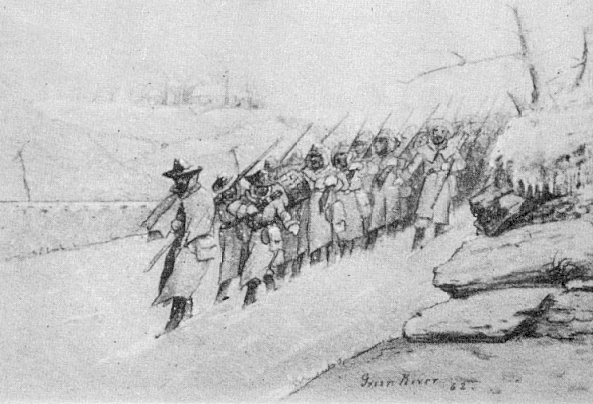Activity in the area diminished and the 32nd Indiana was relegated to garrison duty at Munfordville. The dull monotony of camp life was often augmented by each company alternating night picket duty at the post on the south side of the river near Rowlett's Station. At night, in the face of the enemy, every tree creak, animal movement, every sound and shadow became the lurking foe. Gone now were those lingering Indian summer days and nights. The weather returned to the characteristic cold, driving rains, and the sleet and snowstorms common to Kentucky winters.
In addition to drill, inspections, and police duties a portion of the 32nd was continuously engaged in construction projects. More substantial pontoon bridges were laid; one just below the rail bridge for a new road, replaced the regiment's temporary pontoon, and one further upstream near the ford connected the Louisville and Bowling Green Pikes between Munfordville and Woodsonville. To improve morale and offset the effects of the grueling workload, Willich ordered brick ovens built within days of establishing camp at Munfordville so that the men enjoyed the uplifting luxury of fresh-baked bread daily.
Repairs to the rail bridge finalized on January 9, 1862. Thousands of voices rang out with cheers as the first locomotive chugged across to the south bank of the river. Construction immediately began on a blockhouse to defend the important span. Extensive field works and gun emplacements were erected on the south side of Green River to provide fields of fire to the approaches. With the upcoming offensive Buell could ill afford having this vital link in his chain of supply line severed. The condition of transportation lines south became the next concern.

While at Munfordville in February 1862, Lieutenant Metzner drew this snowy scene of a 32nd Indiana
picket detail returning to camp.
Collection of E. Burns Apfeld.
Light scouting parties had been probing out ahead of the Union lines in search of intelligence but would inevitably be turned back by roaming bands of Confederate cavalry. One sergeant of Wood's 5th Brigade recorded in his diary, "Our picket line was only out a scant three miles from the southern end of the span. The southern scouts kept in frequent touch with our outposts, the very finger ends of Johnson's army by which the slightest advance toward Bowling Green could be detected." [44]
This close proximity of hostile forces cultivated a high state of alert in the Union camps. Alarms, both planned and unexpected, frequently occurred to interrupt normal activity. One such occurrence took place on January 17, as a direct result of foolishness. An explosion on the outer picket line spurred Willich to hastily assemble the regiment, along with the entire brigade, as the drum beat out the long roll of general alarm.